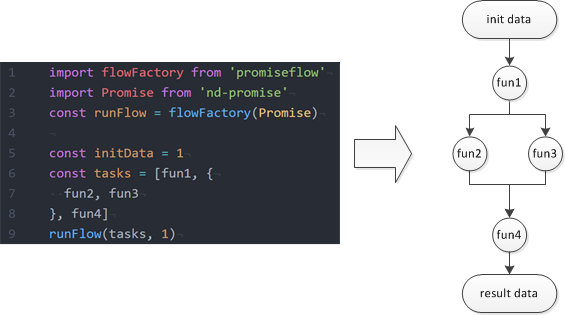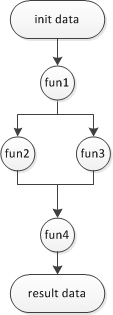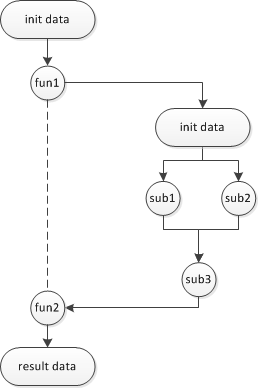promiseflow
v1.0.11
Published
provides series and parallel flow control for promise. using Array to represent tasks in series. using Object to represent tasks in parallel.
Downloads
27
Readme
promiseflow
provides series and parallel flow control for promise. using Array to represent tasks in series. using Object to represent tasks in parallel.

install
npm install promiseflow
Example
series demo

import flowFactory from 'promiseflow'
import Promise from 'es6-promise'
const runFlow = flowFactory(Promise)
const initData = 1
const fun1 = function (data) {
// expect(data).to.be.equal(1)
return data + 1
}
const fun2 = function (data) {
// expect(data).to.be.equal(2)
return new Promise(resolve => {
setTimeout(() => {
resolve(data + 2)
}, 50)
})
}
const arr = [fun1, fun2]
runFlow(arr, initData).then(data => {
// expect(data).to.be.equal(4)
done()
})parallel demo

import flowFactory from 'promiseflow'
import Promise from 'es6-promise'
const runFlow = flowFactory(Promise)
const initData = 1
const fun1 = function (data) {
// expect(data).to.be.equal(1)
return data + 1
}
const fun2 = function (data) {
// expect(data).to.be.equal(1)
return new Promise(resolve => {
setTimeout(() => {
resolve(data + 2)
}, 50)
})
}
const fun3 = function (data) {
// expect(data).to.be.equal(1)
return new Promise(resolve => {
setTimeout(() => {
resolve(data + 3)
}, 50)
})
}
const obj = { fun1, fun2, fun3 }
let promise = runFlow(obj, initData)
promise.then(data => {
// expect(data.fun1).to.be.equal(2)
// expect(data.fun2).to.be.equal(3)
// expect(data.fun3).to.be.equal(4)
// done()
})series + parallel demo

import flowFactory from 'promiseflow'
import Promise from 'es6-promise'
const runFlow = flowFactory(Promise)
const initData = 1
const fun1 = function (data) {
// expect(data).to.be.equal(1)
return data + 1
}
const fun2 = function (data) {
// expect(data).to.be.equal(2)
return new Promise(resolve => {
setTimeout(() => {
resolve(data + 2)
}, 50)
})
}
const fun3 = function (data) {
// expect(data).to.be.equal(2)
return new Promise(resolve => {
setTimeout(() => {
resolve(data + 3)
}, 50)
})
}
const fun4 = function (data) {
// expect(data.fun2).to.be.equal(4)
// expect(data.fun3).to.be.equal(5)
return data.fun2 + data.fun3
}
const arr = [fun1, {
fun2, fun3
}, fun4]
runFlow(arr, initData).then(data => {
// expect(data).to.be.equal(9)
// done()
})sub flows demo

import flowFactory from 'promiseflow'
import Promise from 'es6-promise'
const runFlow = flowFactory(Promise)
const inData = 1
const subFlows = [{
sub1: ret => {
return ret + 1
},
sub2: ret => {
return ret + 2
}
}, ret => {
return ret.sub1 + ret.sub2
}]
const fun1 = function (data) {
// expect(data).to.be.equal(1)
return new Promise(resolve => {
setTimeout(() => {
resolve({
__flow__: true,
flows: subFlows,
inData: data + 1
})
}, 50)
})
}
const fun2 = function (data) {
// expect(data).to.be.equal(7)
return new Promise(resolve => {
setTimeout(() => {
resolve(data + 2)
}, 50)
})
}
const arr = [fun1, fun2]
runFlow(arr, inData).then(data => {
// expect(data).to.be.equal(9)
// done()
})use callback to handle each task
import flowFactory from 'promiseflow'
import Promise from 'es6-promise'
const runFlow = flowFactory(Promise)
const arr = ['series.png', {
img1: 'parallel.png',
img2: 'series_parallel.png'
}, 'sub_flow.png']
const callback = (val) => {
if (typeof val === 'string') {
return function () {
return new Promise((resolve, reject) => {
const img = document.createElement('img')
img.id = val
img.onload = () => {
img.onload = null
img.onerror = null
resolve(img.name)
}
img.onerror = () => {
img.onload = null
img.onerror = null
reject(new Error(`${val} load failed`))
}
img.src = `/base/img/${val}`
document.body.appendChild(img)
})
}
}
return val
}
runFlow(arr, '', callback).then(data => {
// expect(true).to.be.equal(true)
done()
})